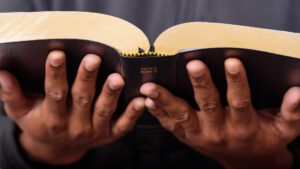Twice now, my husband has been called to pastor a hurting church. When our family arrived, we found believers who were confused, angry, and sad. The circumstances in each congregation were complex—a series of hard events, many without resolution. These congregation-wide difficulties came on top of individuals’ personal struggles and past experiences, meaning each member was enduring a slightly different set of hurts.
Trouble in the church is one of the most painful experiences a believer can have, and the complicated nature of these situations makes them hard to navigate. Neglect, miscommunication, disappointment, conflict, and mistreatment are often tangled up, leaving believers bewildered and overwhelmed.
At such times, examining and understanding hurt’s causes can help us grieve rightly, take appropriate action, and then move forward.
In Scripture, we see at least four sources of church hurt. An experience of hurt may result from just one of them; more likely, it’s a combination of a few. Consider how each affects us.
1. We live in a fallen world.
When sin entered the world, it had far-reaching effects. Not only did humankind fall under its curse, but the rest of creation suffered too. Under “its bondage to corruption . . . the whole creation,” Paul explains, “has been groaning together” (Rom. 8:21, 22). Your basement floods, the neighbor’s dog snarls at you on your morning run, and a poison-ivy rash creeps up your legs. Nothing is quite as it should be in the world God made.
Nothing in the church is quite as it should be either. When your infertility or unwanted singleness makes church feel hard, this is the legacy of Adam’s fall. When a collapsing regional economy means your church plant has to close, you can point the finger at Genesis 2. Some difficulties in the church aren’t the result of a specific sin but of sin’s presence in the world.
Some difficulties in the church aren’t the result of a specific sin but of sin’s presence in the world.
When we suffer under these kinds of hurts, we can turn to the Lord in lament. These hardships aren’t caused by someone’s malicious actions, but they’re still painful. We can cry out with the psalmist, “O LORD, all my longing is before you; my sighing is not hidden from you” (Ps. 38:9). And we can allow our sadness to point us toward that better country where we “shall obtain gladness and joy, and sorrow and sighing shall flee away” (Isa. 35:10).
2. Satan hates the church.
Without spiritual eyes, we’ll be unable to recognize the second cause of church hurt. Some painful things in the church result from an epic conflict happening in the unseen, spiritual places.
In Revelation 12, John receives a vision of the great red dragon who attempts to thwart God’s plan of redemption. When his attack against the male child born of the woman fails, he turns his attention elsewhere: “Then the dragon became furious with the woman and went off to make war on the rest of her offspring, on those who keep the commandments of God and hold to the testimony of Jesus” (v. 17).
Who is this dragon who wars against Christ’s followers? He is “that ancient serpent, who is called the devil and Satan, the deceiver of the whole world” (v. 9).
Satan is a “roaring lion” trying to destroy the church (1 Pet. 5:8). He seeks to disseminate lies (John 8:44), twist our doctrine (2 Cor. 11:3), prevent us from understanding the preaching of the Word (Matt. 13:19), manipulate our anger for his own ends (Eph. 4:26–27), cause controversy in the church (2 Tim. 2:23–26), keep gospel workers from ministry (1 Thess. 2:17–18), magnify offenses to cause us to sin (2 Cor. 2:10–11), trap vulnerable Christians (1 Tim. 5:11–15), destroy new believers (3:6), and incite church members to neglect each other (1 John 3:10).
As we experience such difficulties, we mustn’t be naive about their source. When church hurts, it’s often the pain of battle wounds inflicted by Satan.
In response, we must fight back. Along with the helmet of salvation and the sword of the Spirit, we take up prayer—asking God to give his church boldness and victory against the Evil One (Eph. 6:16–20). And we seek the Spirit’s help to stand on guard, “watchful” (1 Pet. 5:8) and “alert” (Eph. 6:18) lest we fall into Satan’s snares ourselves.
3. People are weak.
“We urge you, brothers,” wrote Paul, “admonish the idle, encourage the fainthearted, help the weak, be patient with them all” (1 Thess. 5:14). Not every problem caused by a church member is attributable to willful sin. Sometimes people are just weak.
An immature believer may want to offer you words of comfort, but his muddled theology makes things worse. Your pastor may want to minister to you, but he doesn’t know the whole story about what you’re going through. A church member may want to befriend you, but her chronic illness and young children make it impossible for her to commit. Each one of us is limited: by our finite progress in holiness, by our lack of knowledge, by our frail bodies. These human limits can be the source of hurt in the church as we feel neglected or misunderstood by people who simply cannot do better than they’ve done.
Christ, too, suffered neglect from weak believers in his hour of greatest need. In Gethsemane, when he asked his disciples to pray with him, they fell asleep—not just once but three times. In his response, our Savior models compassion: “The spirit indeed is willing, but the flesh is weak” (Matt. 26:41). Even when hurt, we, too, can believe the best of others (1 Cor. 13:7) and seek the Lord’s help to “be patient with them all” (1 Thess. 5:14).
4. People sin.
The fourth cause of hurt in the church is the most obvious: people sin. “What causes quarrels and what causes fights among you?” James asks the first-century congregations. “Is it not this, that your passions are at war within you?” (James 4:1). Christ has set us free from sin’s penalty and power, and yet we battle against indwelling sin, even in the church.
Conflict, slander, unkindness, partiality, and abuse in the church come from the sin in people’s hearts. In these situations, the believer’s comfort is that the Lord doesn’t ignore hurt. Under God, every sin is dealt with—either laid on Christ at the cross or paid for by the sinner in eternity. Without error, he “forgiv[es] iniquity and transgression and sin, but . . . will by no means clear the guilty” (Ex. 34:7).
Under God, every sin is dealt with—either laid on Christ at the cross or paid for by the sinner in eternity.
When we’ve been sinned against, we can cry out to God, asking him to do what’s right. We can pursue peace and reconciliation as far as it depends on us (Rom. 12:18; see Matt. 18:15–20), knowing we, too, are sinners in need of mercy. And where appropriate, we can seek justice—appealing to church courts and civil magistrates to act as the agents of God’s own justice.
We may be wounded, but we aren’t without hope. Through every kind of hard situation, we look in faith for Christ to complete his work in the church so that “he might present the church to himself in splendor, without spot or wrinkle or any such thing, that she might be holy and without blemish” (Eph. 5:27). He will surely do it.


































